Related Research Articles

Porbandar district is one of the 33 districts of Gujarat state in western India. The district covers an area of 2,316 km2. It had a population of 5.85,449 of which 48.77% were urban as of the 2011 census. This district was carved out of Junagadh district. It lies on the Kathiawar peninsula. Porbandar city is the administrative headquarters of this district. This district is surrounded by Jamnagar district and Devboomi Dwarka to the north, Junagadh district and Rajkot district to the east and the Arabian Sea to the west and south.
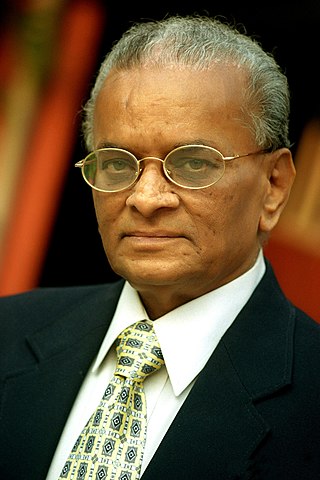
Chandrakant Keshavlal Bakshi was an Indian Gujarati-language author from Gujarat, India and a former Sheriff of Mumbai. He was known for his bold and new concepts in writing during his time in Gujarati literature. He is also addressed as Bakshi or Bakshibabu. Born in Palanpur, he completed higher education and had a business in Calcutta. He started writing there and later moved to Mumbai for his teaching career. He wrote 178 books, and wrote extensively in newspaper columns.
Safari is a monthly science and general knowledge magazine published in Gujarati and English language, by Harshal Publications, Ahmedabad in Gujarat, India. Its editor and publisher is Nagendra Vijay.
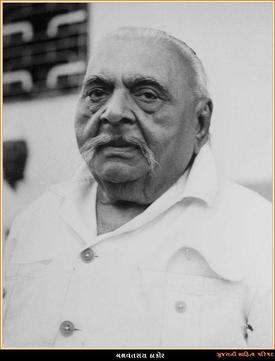
Balwantray Kalyanray Thakore, popularly known as B. K. Thakore, was a poetry teacher and one of the great pioneers of the Pandit yug, during the turn of the twentieth century period in Gujarati literature. Known as 'Ballukaka' in his intimate circle, he played a key role in the development of modern Gujarati poetry.

Nagendra Vijay is an Indian science writer in Gujarati language. He is a son of pioneering journalist and science writer Vijaygupta Maurya. He founded the first science magazine in the Gujarati language called Scope and wrote several books. The Nagendra Vijay Science Foundation also launched the English-language science magazine Safari, in March 2008, of which he is the Editor-in-Chief. He had previously published newsweekly Flash and a science magazine Scope. He has two sons: Vishal Vasu, an IT consultant and Harshal Pushkarna, a science author.
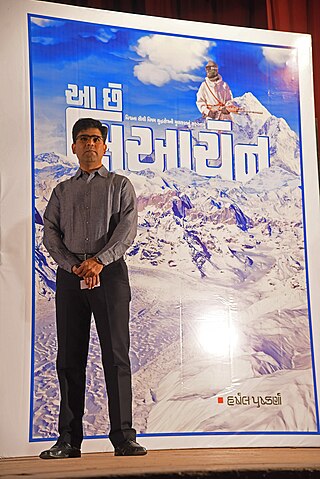
Harshal Pushkarna was an executive editor and writer in Safari magazine. He is the son of Nagendra Vijay and grandson of Vijaygupta Maurya. He owns and publishes Gujarati travel magazine Gypsy Traveller, and writes for Gujarat Samachar Daily.

Vijay Maurya is an Indian actor, screenwriter and director who works in Indian films and theatre. He is best known for his work in the 2019 film Gully Boy.
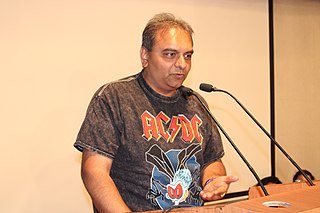
Jay Vasavada is Gujarati language writer, orator and columnist from India. Born in Bhavnagar and brought up in Gondal, Gujarat, he writes columns in various publications since 1996. He has published several books compiling his columns.

Kaajal Oza Vaidya is an author, screenwriter, radio personality and journalist from Ahmedabad, India. She initially worked as a journalist and actress. She has written more than 56 books including novels, short stories and essays. She has written stories, dialogues and scripts of soap operas and films. She writes columns in several publications and hosts a radio show.
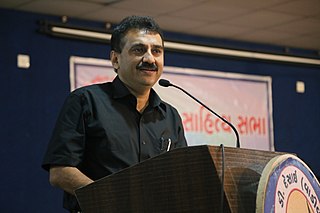
Raeesh Maniar is a Gujarati language poet, translator, playwright, columnist, compere, lyricist and script writer from Gujarat, India. His significant works include Kafiyanagar (1989), Shabda Mara Swabhavma J Nathi (1998) and Aam Lakhvu Karave Alakh Ni Safar (2011). He has written two reference books for students of ghazals, Ghazal: Roop ane Rang (2006) and Ghazal Nu Chhandovidhan (2008). The later work contains original research that may be applicable to prosody of all north Indian languages. He has written lyrics for several Gujarati and Hindi language movies. The Indian National Theater of Mumbai awarded him the Shayda Award for 2001 and the Kalapi Award for 2016 for his contributions to Gujarati ghazal poetry.
Kamal Vora is a Gujarati language poet and editor from Mumbai, India. He is an editor of Etad, a quarterly Gujarati literary magazine.
Mansukhlal Maganlal Jhaveri (1907–1981) was a Gujarati language poet, critic, and literary historian of the Gandhian era. He was deeply interested in classical Sanskrit poetry and authored History of Gujarati Literature (1978). Jhaveri had several pen-names including Devaki Ayodhya, Punarvasu, Madilant, Samintiyajak, and Siddhartha.

Manilal Haridas Patel is a Gujarati poet, essayist, novelist, and literary critic from Gujarat, India. He has won numerous awards for his work, including the 2007 Dhanji Kanji Gandhi Suvarna Chandrak literary medal for his significant contributions to Gujarati literature.
Priyakant Premachand Maniyar was a Gujarati poet from Gujarat, India. He published seven collections of symbolic and imagist poetry, and was awarded the Sahitya Akademi Award posthumously in 1982 for Lilero Dhal (1979), a collection of love songs about Radha and Krishna.

Vijay Ramanlal Shastri is an Indian Gujarati language short story writer, novelist, critic and translator. He was educated and worked at the M. T. B. Arts College in Surat and has written more than two hundred short stories in addition to several works of criticism.
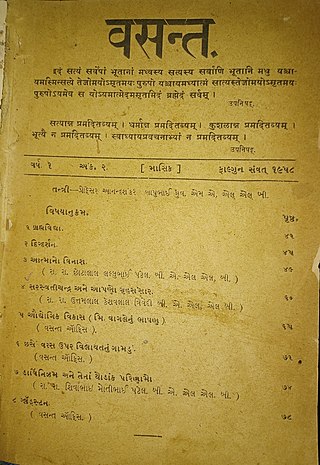
Vasant was a Gujarati-language magazine founded and edited by Anandshankar Dhruv, which ran from 1902 to 1939. The magazine played a key role in the development of Gujarati prose writing, and is considered to hold a significant place in the tradition of Gujarati literary magazines.
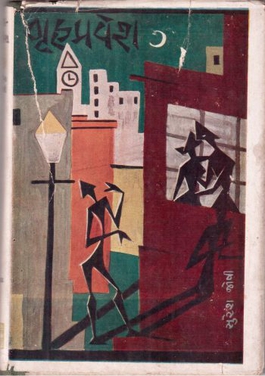
Grihapravesh is a 1957 collection of short stories by Indian writer Suresh Joshi, written in Gujarati. The collection gave rise to a new form of short story writing in Gujarati literature, favouring language over plot.

Pranav Vinodbhai Pandya is a Gujarati-language writer, poet and columnist from Gujarat, India. In 2013, he received Kavi Ravji Patel Yuva Sahitya Pratibha Award, instituted by Gujarat Samachar. In 2019, the Indian National Theatre awarded him the Shayda Award for his contribution to Gujarati poetry.
Nimit Oza is an Indian writer, columnist, and doctor from Gujarat, India. An urologist by profession, he is known for his novel Chromosome XY (2019) and Pappa ni Girlfriend (2020). He won the 2020 Darshak Award for Chromosome XY.

Prahlad Damodardas Brahmbhatt was an Indian Gujarati-language novelist, short story writer, biographer and journalist from Gujarat, India, known for his social novels. He authored more than 90 novels, some of which were adapted into films.
References
- 1 2 3 4 Khambhayata, Lalit (22 February 2010). "વિજયગુપ્ત મૌર્ય જીવંત જ્ઞાનકોષને શતાબ્દિવંદન!". Divya Bhaskar . Retrieved 24 October 2012.
- 1 2 3 Pushkarna, Harshal. "Vijaygupta Maurya", Gujarati : એક નજર આ તરફ..., 22 March 2009, accessed 7 December 2010.